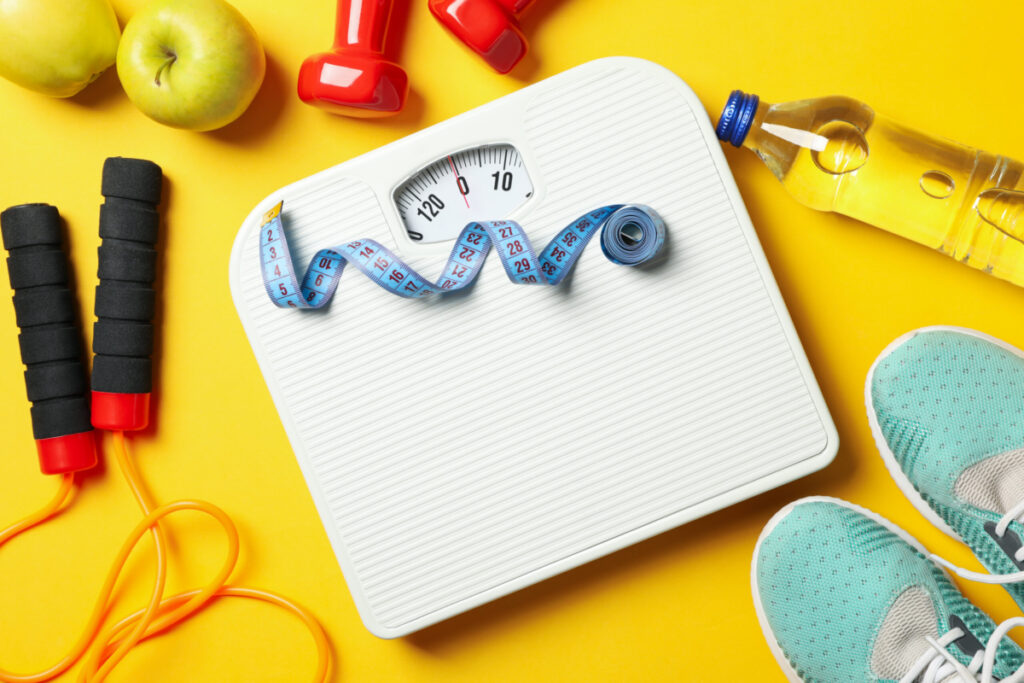You have been trying to lose that lousy fat from your body for a while now. But it’s been a long time since you have seen no satisfactory results. Let me guess; you’re planning to try on creatine.
But should I take creatine while trying to lose weight?
Creatine can help to lose weight. But our midsection might appear swollen or puffy as the worst-case scenario. However, you won’t be gaining any actual fat. Creatine is not a magic solution, and there is a matter of combination with a healthy diet and regular exercise routine.
In this blog, I have provided brief yet detailed information on whether losing weight with creatine works. Let’s get started.
Creatine and Weight Loss: Does It Help At All?
Water retaining and muscle build-up: two essential tasks that creatine does to your body. So you will lose weight due to water retaining and might gain weight due to muscle build-up.
I have found a study about 4 weeks of intense training during the cutting phase on thirty explosive athletes. Creatine had an ergogenic effect in an acute complex training bout. The benefits included improved body fat percent, muscle strength, and power performance.
Due to muscle strength and increased performance, the fat-cutting process got a boost. They consumed 20 g of creatine for 6 days. Some studies show creatine can increase endurance without affecting fat mass.
Should I Take Creatine While Trying To Lose Weight?
Now, increased muscle mass leads to a higher metabolic rate. That leads to higher calorie burning even when you’re not working out. So, you can say creatine can boost metabolism. Ultimately you lose some extra unwanted weight.
Another study shows the potential role of creatine in reducing fat mass in aging people of ≥50 years. Those who consumed creatine lost more fat compared to those who didn’t. As well as they gained lean muscle mass as well.
This study has proven creatine reduces muscle breakdown and retains muscle during exercise.
However, Creatine can make you gain weight due to water retention and lean muscle building. Both of which can make you gain weight. The fun fact is, there’s no evident report of gaining weight due to fat gain by consuming creatine.
Bottomline, Creatine will build lean muscle for you and provide you with increased performance. You will gain lean weight but not extra fat around the belly.
How Much Creatine is the Proper Dose?
The best-recommended dose for Creatine intake is 0.3 grams per Kg of your body weight. You can divide the dose into four and continue for 5–7 days.
Then comes the recommended dose according to
- Your age
- What kind of exercises are you into
- What are your goals, and
- How long are you planning to continue
According to Krissy Kendall, Ph.D. (exercise physiologist and researcher), there’s nothing wrong with taking creatine monohydrate; almost everyone should take it. However, it’s not recommended for people under the age of 18.
Because it’s the age to improve sports performance through nutrition and athletic training, not being of proper age, you might face severe diseases such as heart failure/disease, muscular/neuromuscular diseases, and stroke.

Above 18, you can take creatine
- As creatine loading, you can take it as a batch of 20 g daily for 4-7 days.
- As a batch of 10g on training days or 5g on non-training days.
You can start with 10 grams to 20 grams of creatine daily to boost your performance if you are an athlete. This dose is evident in increasing stamina or performance in aerobic activity. However, this might not be effective for older people.
Creatine is possibly safe when taken for a long time. For example, for up to 5 years, with doses of up to 10 grams daily.
Types of Creatine You Can Try On
There are six most studied types of Creatine available. Read on to know more;
Creatine Monohydrate
Creatine monohydrate is the most common type of Creatine proven to increase muscle performance in short-duration, high-intensity resistance exercises. Studies show that taking Creatine monohydrate benefits athletes during strength training, notably weightlifting, and cycling.
Creatine Ethyl Ester
Creatine Ethyl Ester (CEE) is evident to have better stability and excellent efficiency. It suits strength-speed sports such as ice hockey, basketball, handball, and climbing. There is a study that indicates it has better absorption than creatine monohydrate.
However, another study directly states Creatine Ethyl Ester is worse at increasing creatine content in the blood and muscles. That’s why most nutritionists do not recommend using ethyl ester.
Creatine Hydrochloride
Creatine Hydrochloride is rather almost as popular as Monohydrate. There’s a proven study that creatine HCl is 38 times more soluble than the monohydrate form. That’s why you can use a lower dose without having an upset stomach.
There is currently no scientific research on the effectiveness of creatine HCl in humans. So it cannot be recommended as superior to creatine monohydrate until further studies have been conducted to compare the two.

Buffered Creatine
Buffered creatine is made from a mixture of creatine and alkaline powder. It is proven to improve your metabolism, muscle size, strength, and power. But you must maintain a regular workout schedule and drink plenty of water.
Liquid Creatine
Typically, its creatine monohydrate is in a liquid form. There’s one study about cycling performance. Performance was improved by 10% more with monohydrate powder rather than liquid form.
Creatine Magnesium Chelate
Simply put, in Creatine magnesium chelate; magnesium is attached to the creatine molecule. It will provide the body with bioavailable magnesium and increase the muscle’s ability to generate and recycle energy from ATP.
What Kind Of Exercises Do You Have to Go Through?
If you are intaking Creatine to lose weight, regular exercise will boost the process. A few sets of exercises can or must be followed to lose weight. Check them out;
Cardiovascular exercises
Here’s a list of exercises;
Strength training
Here’s a list of exercises;
- Brisk walking.
- Running.
- Jogging or jogging in place.
- Burpees.
- Bear crawls.
- Swimming.
- Water aerobics.
- Cycling/bicycling.
High-intensity interval training (HIIT)
Here’s a list of exercises;

- Push-up
- Burpee
- Mountain climber
- Plank jack
- Russian twist
- Jumping jack
- Kettlebell swing
- Squat with overhead press
Yoga or Pilates
Here’s a list of exercises;
- The Roll-Up
- The Roll-Over
- Single-Leg Circles
- Rolling Like a Ball
- The Single-Leg Stretch
- The Double-Leg Stretch
- Spine Stretch Forward
- Open-Leg Rocker
FAQ
Is it possible that you might be gaining weight instead of losing weight while on creatine?
Yes, certainly. But you have to realize which type of weight you are gaining. There’s no proven evidence of gaining fat mass while taking creatine. But there are countless studies about gaining good muscle mass.
Conclusion
My friend and I started taking creatine regularly according to our body mass. I was the big guy. He was half the size of me. He was trying to gain weight, and I was trying to lose some extra fat.
Eventually, it worked, but my friend suffered stomach-upsetting events like diarrhea. However, he gained some excellent muscle profiles.
In my opinion. Creatine will help you to gain weight, as well as lose weight. But both of these will be done by building lean muscle. Check our blogs to learn more.

I am a health and wellness enthusiast working in a Pittsburgh-based wellness clinic. My primary role as a consultant is to tailor a balanced lifestyle for my patients, where positive steps and potent supplements play a synergistic role.

